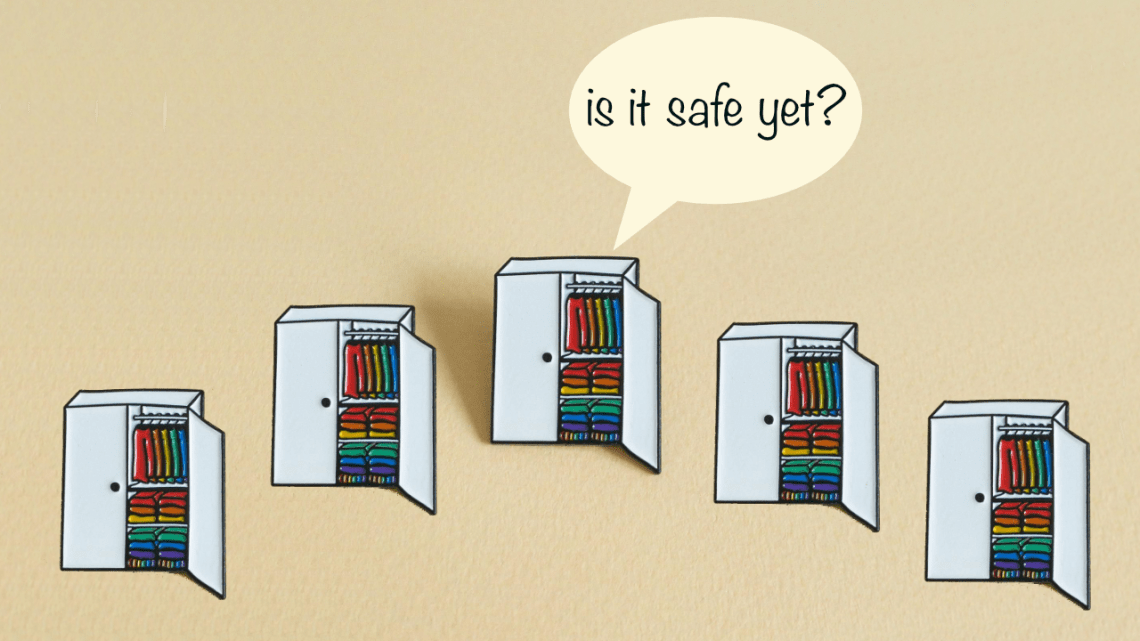Things to think about before making up your mind.
Coming out and living openly aren’t something you do once, or even for a particular amount of time. It’s a journey that we make every single day of our lives. Every coming out experience is unique and must be navigated in the most comfortable way for your own self. Whether it’s for the first time ever or the first time today, coming out can be difficult and isn’t always simple. Throughout the coming out process, many people feel a combination of emotions ranging from scared, confused, vulnerable, and uncertain, to relieved, proud, empowered, and brave. If you are thinking about whether you should come out to your friends/family/workplace/the world, then this article will walk you through some important questions that you will have to answer for yourself first.
How long have you known?
It is important to first ensure that you are comfortable in your own skin and identity. If you have only recently rediscovered yourself, it might be prudent to spend some time exploring what that might mean to you, and become familiar with all aspects of this part of you. Before you come out to others, it is important to come out to yourself. One of the many ways you can do this is through reaching out to LGBT Support groups, or role models that you look upto from the community. You could also access the unlimited information available in ways of articles, and infographics about different kinds of sexualities and gender identities. Only when you have accepted yourself completely for who you are, should you focus on whether or not to come out to others.
Is this a good time?
The next step is to gauge how safe it would be for you to come out. While there are a lot of benefits to coming out, like being able to live openly and freely, developing closer and more genuine relationships, reducing stress of hiding our real selves from the world, finding support of the community, and connecting with other queer folk. But it also can be full of risks like being rejected or misunderstood at the moment, family and loved ones might not take the news well and may express shock, confusion, denial, or even become aggressive and hostile. Some relationships might completely change (for the better, or worse), it’s possible that you might be at greater risk of physical harm, apart from harassment and/or discrimination. Some young people, especially those under age 18, may even be disowned or lose financial support from their parents. Since there are so many risks involved, it is important to determine the attitudes of the people you are thinking of coming out to.
Am I equipped to answer the questions?
When you come out, it is likely that people will have questions, and concerns. Many times, it is due to misinformation and lack of access to the correct resources. Before you come out, you need to equip yourself with the right information surrounding your identity, including the myths and misconceptions that you might have to address. It also helps to be confident when you know what you’re going to say when you come out. Be ready with a predetermined list of the things you definitely want to say, along with the kind of words you want to use.
Am I prepared for negative reactions?
As discussed above, it is very probable that you would be met with some kind of resistance, disbelief, or rejection. You need to think about whether you are emotionally, financially, and mentally prepared to withstand these consequences. If it is family, it is likely that they will take time to deal with and understand what that means for their own dreams and expectations of your future. It is also possible that some family members may never be able to come around to accepting and loving you for who you are. You need to assess whether that is something that would influence your decision.
Do I have a support system in place?
This is an important question because in case you are no longer safe, you need to be surrounded by and supported by people that you trust, who you know will accept you no matter what. There are several support groups, NGOs, and shelters that work towards the safety of LGBT individuals. It might be necessary to contact one close to you before you come out in case you feel that you might be in need of emotional, mental, financial, or sustenance support.
Am I okay with coming out multiple times over time?
After you come out to most of the important people in your life, you will navigate daily life decisions where you will have to choose whether you want to let someone know about your identity or not. For example, at work, or when you make a new friend, when you travel, and so on. Would this exercise feel like a reaffirmation of your identity every time, or feel stressful and scary?
Am I feeling pressured or do I really want to do this?
When you compare the pros and cons of being open about who you are, it’s important to remember that the person in charge of your coming out journey is you and you alone. You decide who to confide in, when to do it and how. You also decide when coming out just may not be right, necessary or advisable. There is no one right or wrong way to come out or live
openly. Choosing to come out or to be open does not mean you have to be out at all times or in all places — you decide how, where and when, based on what’s right for you. Your sexual orientation and gender identity are important pieces of you, but they do not have to define you. For more resources to help you navigate this decision, you can click here.
Meet The Author








